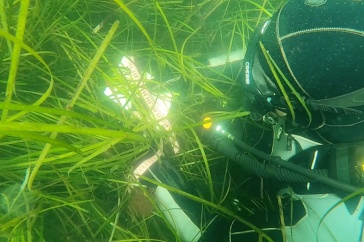
It’s a science outpost in an idyllic setting: Shoals Marine Laboratory (SML), with its island-based labs and classrooms, is synonymous with hands-on, active learning about the sea. Its staff members are making changes to ensure that everyone feels welcome there, and now they are being recognized for their strategic plan to advance equity in field science. The Organization of Biological Field Stations has awarded SML a 2022 Honorable Mention for Innovation, noting that their plan is more than just words — there is a significant level of community interaction involved to make science in the field safer and more inclusive for underrepresented and marginalized students.
“We cannot do good science that addresses the big challenging issues like climate change and biodiversity loss without everybody participating,” says Jennifer Seavey, director of SML. “Your background influences the types of questions you ask, so if we are lacking in representation, we won’t even be able to fully understand the problems, much less solve them.”
SML’s Strategic Plan for Advancing Belonging — Seavey prefers to use the term belonging because it feels more holistic than diversity, equity and inclusion — is full of action items that chart the course to a more welcoming environment on Appledore Island, where SML is located eight miles off the coast of New Hampshire?and Maine.
"Field stations are places where you need to pull the oar extra hard to make sure everyone feels safe and supported."
As part of the Belonging Plan, SML initiated a Diversity Scholarship that now offers more than $100,000 to reduce financial barriers for underrepresented undergraduates who want to attend the island-based classes. That scholarship helped to double the number of students of color who attended classes on the island — a very modest but important step forward, Seavey notes. The SML staff members recently developed a high-school program for students of color and those living in underresourced communities near Manchester, New Hampshire, and Dorchester, Massachusetts, that offers exposure to marine science and sustainable engineering. SML has also increased the diversity of its faculty, noting that a diversity of backgrounds and perspectives helps to strengthen the island experience.
Seavey explains that field science can be exceptionally difficult for women, people of color or any marginalized group, primarily because of the remote field locations where that work takes place; harassment tends to happen more frequently on a boat or an island where the lines between the work and private lives can be hard to maintain. Using a rowing metaphor to describe the solution to this challenge, she says, “Field stations are places where you need to pull the oar extra hard to make sure everyone feels safe and supported.”
To that end, SML’s staff members are continuing their education on racism and discrimination, identifying safer methods of reporting discrimination, recruiting guest speakers who specialize in environmental justice and identifying policies and practices that create barriers for marginalized people. The Belonging Plan is an ambitious document, one that will be reviewed and revised yearly to ensure the best support of students who need it the most.
“SML is the largest undergraduate-serving marine lab it the country, and as such, we have a lot to contribute and a responsibility to act,” Seavey adds. “Field stations need to support each other in our efforts to do better, so I think it’s great that the Organization of Biological Field Stations is recognizing the work happening around the world to improve field work access and conditions for marginalized and underserved people. It makes me excited to keep improving and working toward?a better tomorrow.”
The?UNH Institute for the Study of Earth, Oceans, and Space (EOS)?is UNH's largest research enterprise, comprising six centers with a focus on interdisciplinary, high-impact research on Earth and climate systems, space science, the marine environment, seafloor mapping and environmental acoustics. With approximately 100 principal investigators managing more than 400 individual grant awards, and with annual expenditures exceeding $77?million, EOS fosters an intellectual and scientific environment that advances visionary scholarship and leadership in world-class and graduate education.??
-
Written By:
Rebecca Irelan | Institute for the Study of Earth, Oceans, and Space | rebecca.irelan@unh.edu | 603-862-0990



















































